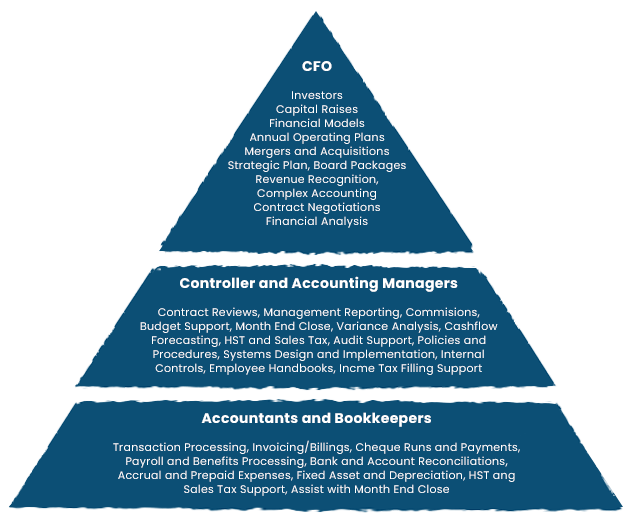I frequently hear people refer to Bookkeepers, Controllers, and CFOs interchangeably. As outlined in our previous article on the differences between Bookkeepers, Controllers, and CFOs, while these roles may have some overlap, they have distinct responsibilities and functions. Additionally, the individuals performing them will normally have different experience levels and capabilities. It is important that you engage a person with the right skill set to achieve your objectives otherwise you will either end up disappointed with the final product, or paying more than necessary for what you need.
The Role of a Bookkeeper
A Bookkeeper is responsible for entering all financial transactions into the accounting system. This includes recording daily transactions, managing accounts payable and receivable, reconciling bank statements, and generating basic financial reports. A Bookkeeper can also assist with payroll processing and HST/GST compliance. They are focused on the day-to-day financial operations of the business and work to keep things running smoothly. The work performed by a Bookkeeper lays the fundamental financial groundwork of an organization and a Controller or CFO relies on this foundation to manage the finance function.
A startup typically needs an experienced Bookkeeper from inception. As soon as the business begins to incur financial transactions, it’s essential to keep accurate and organized records. This will enable the company to manage the business, meet its reporting requirements, and facilitate tax compliance.
Speaking from experience, I know that many entrepreneurs want to run as lean as possible and therefore try to perform the Bookkeeping on their own. This normally results in a significant clean-up, with additional costs, once an experienced Bookkeeper is brought on to manage the financials. I’ve seen numerous instances where poor basic financial record keeping has significantly delayed capital raises and M&A activity. A Bookkeepers early involvement is crucial for establishing good financial practices and providing a solid foundation for the startup’s financial management.
The Role of a Controller
A Controller manages the financial operations and compliance of a business. Controllers are focused on ensuring the accuracy of financial data and ensuring compliance with accounting and tax requirements. They will normally oversee financial reporting (including external reviews and audits), financial process design and implementation (including your accounting tech stack), developing finance policies, financial forecasting, and management reporting and analysis.
As a company grows, the complexity of its finance operations and reporting increases. A Controller will become crucial to ensure that the company has transparent, accurate and timely financial information and analysis to drive decisions. For example, when a company begins generating revenue, or adds new revenue streams, it will need to establish a revenue recognition policy that is in compliance with accounting standards and establish scalable processes. This is where a Controller would thrive.
In a startup environment, a Controller will normally be required when the company’s financial reporting becomes more complex as a result of factors such as increased revenue, increased transaction volume, investor reporting requirements, enhanced management reporting needed to drive decision making, geographical or product expansion, or compliance.
In an effort to keep costs low, many startups will call on their Bookkeeper to perform double duty and also perform some Controller responsibilities. This often leads to material issues such as incorrect revenue recognition or drawing conclusions based on poor financial data. For example, on more than one occasion, I’ve seen companies incorrectly estimate their cash life due to their financial statements being incorrect. In another example, a Company estimated that they had 16 months of cash runway but when our Controller reviewed their financials, they found that the Company actually only had 5 months of cash runway due to a few errors in their financials and assumptions.
Bookkeepers normally focus on daily transactions, recording data, and maintaining ledgers, while Controllers engage in financial analysis, strategic planning, and ensuring regulatory compliance. The distinction arises from the depth of expertise and strategic involvement required for Controller functions, often beyond the scope of a Bookkeeper’s role and training. The combination of a Bookkeeper and a Controller ensures a comprehensive and well-managed financial function, supporting both day-to-day operations and long-term financial planning.
The Role of a CFO
The CFO plays a strategic leadership role. The CFO is responsible for managing a company’s financial strategy, fundraising, financial planning (modelling and budgeting), and analysis. A CFO will be able to work cross functionally with other departments to effectively forecast growth and ensure strategic alignment across the organization to achieve the company’s goals while providing insights to support key business decisions. CFOs also manage financial risk and ensure that the company is financially stable and well-positioned for growth.
A startup will normally need a CFO when their financial operations become more complex either through rapid growth, investor or funding requirements, capital raises, or external factors such as compliance. A good CFO will be able to help manage that complexity and provide the visibility required to make sound decisions.
We will often receive calls for CFO assistance when a company wants to prepare for a round of financing or has just closed one as the Company is planning for rapid scale and increased complexity in the business. In these situations, one of our CFOs are able to come in and ensure that the Company’s financial strategy aligns with its business objectives and vision. For example, we’ve seen many instances where a Company raises a large round of capital and plans to go on a hiring spree, however, the increased spend reduces cash life further than expected, ultimately, resulting in an exercise to balance the desired cash life with business objectives. This requires the skill and expertise that a CFO brings to the table.
The following graphic illustrates some of the responsibilities of the Bookkeeper, Controller and CFO.

Summary
As you can see, Bookkeepers, Controllers, and CFOs all play distinct and important roles in the effective management of a finance department within an organization. It is important that you consider your company’s needs when building your finance team to ensure that you have somebody with the appropriate skill set for your stage of company. If you decide to outsource your startup accounting or bookkeeping, working with a firm that has the ability to grow with you and offer strategic financial advice at the Controller or CFO level is a good way to go. Not only will you get your compliance taken care of, but you will have access to a strategic sounding board to help you with the really valuable and hard stuff.
BrightIron has built a team of experienced Bookkeepers, Controllers, and CFOs that can help you with your finance needs.
